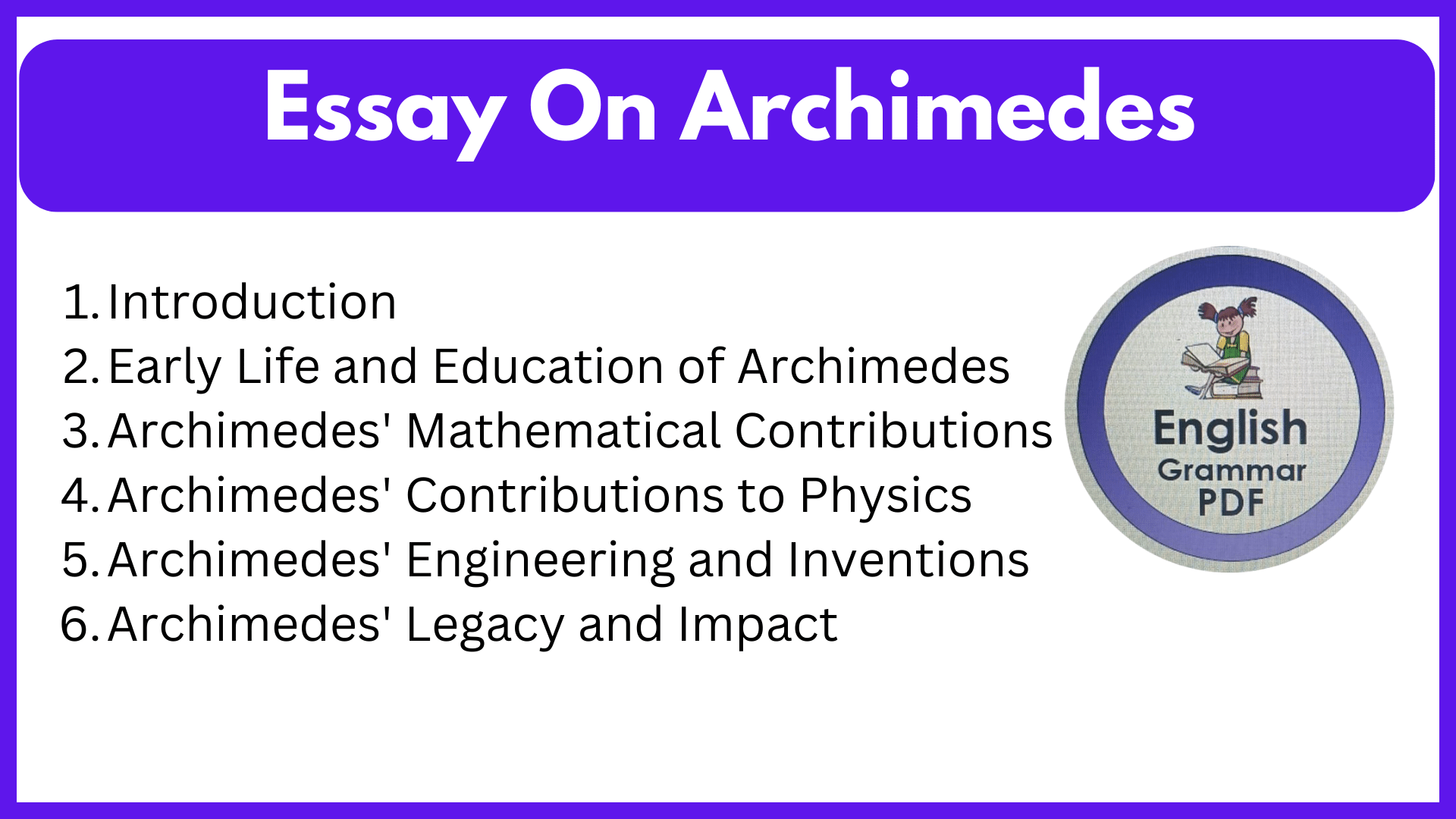Essay On Archimedes
Outline of Essay:
- Introduction
- Early Life and Education of Archimedes
- Archimedes’ Mathematical Contributions
- Archimedes’ Contributions to Physics
- Archimedes’ Engineering and Inventions
- Archimedes’ Legacy and Impact
Introduction
Archimedes, an esteemed mathematician, physicist, and engineer of ancient Greece, left an indelible mark on the scientific world with his groundbreaking contributions. This essay delves into the life, accomplishments, and enduring legacy of Archimedes, highlighting his revolutionary work in mathematics, physics, and engineering. Through his innovative ideas and problem-solving skills, Archimedes not only transformed ancient science but also laid the foundation for modern scientific principles.
Early Life and Education of Archimedes
Archimedes, one of the most influential figures in ancient science, was born and raised in Syracuse, a prominent city in Ancient Greece. Born around 287 BC, Archimedes had the privilege of growing up in a family of scholars and within an intellectually stimulating environment. His upbringing in Syracuse laid the foundation for his exceptional education and future accomplishments.
Archimedes’ education was shaped by the guidance of notable mentors who played a crucial role in his intellectual development. His father, Phidias, and his uncle, King Hiero II of Syracuse, provided him with learning opportunities and encouraged his pursuit of knowledge. Under their guidance, Archimedes was exposed to a wide range of subjects, fostering a deep curiosity and a thirst for understanding.
From an early age, Archimedes displayed a keen interest in mathematics and problem-solving. His passion for these disciplines became evident as he immersed himself in studying various mathematical concepts and exploring intricate problems.
Archimedes’ commitment to understanding the world through mathematics and his dedication to solving complex puzzles set him on a path to becoming one of the greatest mathematicians and scientists of his time.
Archimedes’ Mathematical Contributions
Archimedes’ mathematical contributions were nothing short of revolutionary, propelling the field of mathematics forward and leaving an indelible mark on the study of geometry and calculus. One of his most notable achievements was the method of exhaustion, a groundbreaking technique that he employed to calculate areas and volumes of irregular shapes.
By inscribing and circumscribing polygons around these shapes, Archimedes was able to approximate their areas and volumes with remarkable accuracy. This method laid the foundation for integral calculus and provided a framework for the calculation of areas and volumes that was far superior to previous methods.
Furthermore, Archimedes’ estimation of π (pi) brought significant advancements to the field of geometry. Through his inscribed and circumscribed polygons, Archimedes was able to calculate an approximation of pi that surpassed the existing knowledge of the time. This discovery not only expanded our understanding of this irrational number but also paved the way for further developments in geometry and trigonometry.
In addition to his practical contributions, Archimedes made significant strides in the realm of mathematical proofs. He developed rigorous proofs to support his mathematical propositions, elevating the field of mathematics and setting a standard for mathematical reasoning. His emphasis on proof-based mathematics had a profound impact on subsequent mathematicians, inspiring them to pursue a more rigorous approach to mathematical inquiry.
Archimedes’ Contributions to Physics
Archimedes made significant contributions to the field of physics, revolutionizing our understanding of various principles and phenomena. One of his notable achievements was the formulation of Archimedes’ principle, which explains the concept of buoyancy.
This principle states that an object submerged in a fluid experiences an upward buoyant force equal to the weight of the fluid displaced by the object. Archimedes’ principle provided a profound insight into the behavior of floating and submerged objects and has since become a fundamental principle in fluid mechanics.
Furthermore, Archimedes’ studies on levers and pulleys brought significant advancements to the field of mechanics. He explored the concepts of mechanical advantage and equilibrium, discovering the relationships between force, distance, and balance. His experiments and theoretical work on levers and pulleys not only facilitated practical applications in various industries but also laid the foundation for our understanding of basic mechanical principles.
Archimedes also conducted experiments on equilibrium and the center of gravity, deepening our understanding of stability and the distribution of weight in objects. His investigations allowed for more accurate and effective designs of structures, machines, and even war machines.
Archimedes’ Engineering and Inventions
Archimedes, the renowned ancient Greek scholar, displayed not only his mathematical and scientific genius but also his remarkable engineering prowess through his inventive designs and creations. Archimedes’ engineering and inventions played a significant role in shaping the ancient world and continue to influence modern engineering practices.
One of Archimedes’ notable engineering achievements was his development of war machines. During the siege of Syracuse, he devised ingenious devices, such as the “Archimedes’ Claw” and the “Heat Ray,” which proved to be formidable defensive weapons against invading forces. These war machines, with their advanced mechanisms and innovative designs, showcased Archimedes’ strategic thinking and engineering acumen.
Additionally, Archimedes is famously associated with the invention of the Archimedes screw. This revolutionary device was used for raising water from lower levels to higher levels, utilizing a rotating screw inside a tube.
The Archimedes screw had widespread applications in irrigation systems, enabling efficient water management and agricultural development. Even today, variations of the Archimedes screw are utilized in various industries, such as wastewater treatment plants and agricultural machinery, highlighting the enduring impact of his invention.
Archimedes’ engineering prowess extended beyond war machines and the Archimedes screw. His expertise in mechanics and understanding of levers and pulleys allowed him to design practical machines that improved everyday tasks.
Archimedes’ contributions to engineering not only showcased his innovative thinking but also laid the foundation for modern engineering practices, influencing the design and construction of machines and structures.
Archimedes’ Legacy and Impact
Archimedes’ legacy and impact on the scientific world are profound and far-reaching. His contributions to mathematics, physics, and engineering have left an indelible mark on the course of scientific progress.
In the realm of mathematics, Archimedes’ innovative techniques and rigorous proofs laid the foundation for future advancements. His method of exhaustion, used to calculate areas and volumes of irregular shapes, paved the way for the development of calculus. Archimedes’ estimation of pi (π) pushed the boundaries of geometric understanding and had lasting implications for the field. His mathematical principles continue to inspire and guide mathematicians to this day.
Archimedes’ contributions to physics were equally significant. His principle of buoyancy, now known as Archimedes’ principle, revolutionized the understanding of fluid mechanics and buoyant forces. This principle has applications in diverse areas such as shipbuilding, hydrodynamics, and even modern technologies like submarines. Archimedes’ studies on levers and pulleys established fundamental principles in mechanics, which are still taught and applied in engineering disciplines.
In the realm of engineering, Archimedes’ inventive designs and practical solutions were ahead of his time. His war machines and inventions for defense demonstrated his strategic thinking and engineering prowess. The Archimedes screw, a device he invented for raising water, remains relevant in contemporary engineering applications such as irrigation systems and wastewater management.
FAQ’s
What did Archimedes discover?
Archimedes made numerous discoveries and contributions. He discovered principles in mathematics, such as the method of exhaustion and the estimation of pi. He also discovered the principle of buoyancy, now known as Archimedes’ principle, in physics.
When was Archimedes’ principle discovered?
Archimedes’ principle was discovered by Archimedes himself during the Hellenistic period in ancient Greece. It is believed to have been formulated around the 3rd century BC.
Explore More Essays:
Download the PDF of the Essay:








